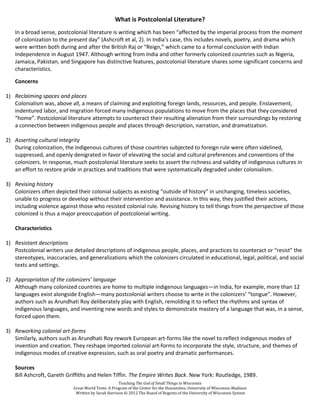Mais conteúdo relacionado Semelhante a Postcolonial Literature (20) 1. Teaching The God of Small Things in Wisconsin
Great World Texts: A Program of the Center for the Humanities, University of Wisconsin-Madison
Written by Sarah Harrison © 2012 The Board of Regents of the University of Wisconsin System
What is Postcolonial Literature?
In a broad sense, postcolonial literature is writing which has been “affected by the imperial process from the moment of colonization to the present day” (Ashcroft et al, 2). In India’s case, this includes novels, poetry, and drama which were written both during and after the British Raj or “Reign,” which came to a formal conclusion with Indian Independence in August 1947. Although writing from India and other formerly colonized countries such as Nigeria, Jamaica, Pakistan, and Singapore has distinctive features, postcolonial literature shares some significant concerns and characteristics.
Concerns
1) Reclaiming spaces and places
Colonialism was, above all, a means of claiming and exploiting foreign lands, resources, and people. Enslavement, indentured labor, and migration forced many indigenous populations to move from the places that they considered “home”. Postcolonial literature attempts to counteract their resulting alienation from their surroundings by restoring a connection between indigenous people and places through description, narration, and dramatization.
2) Asserting cultural integrity
During colonization, the indigenous cultures of those countries subjected to foreign rule were often sidelined, suppressed, and openly denigrated in favor of elevating the social and cultural preferences and conventions of the colonizers. In response, much postcolonial literature seeks to assert the richness and validity of indigenous cultures in an effort to restore pride in practices and traditions that were systematically degraded under colonialism.
3) Revising history
Colonizers often depicted their colonial subjects as existing “outside of history” in unchanging, timeless societies, unable to progress or develop without their intervention and assistance. In this way, they justified their actions, including violence against those who resisted colonial rule. Revising history to tell things from the perspective of those colonized is thus a major preoccupation of postcolonial writing.
Characteristics
1) Resistant descriptions
Postcolonial writers use detailed descriptions of indigenous people, places, and practices to counteract or “resist” the stereotypes, inaccuracies, and generalizations which the colonizers circulated in educational, legal, political, and social texts and settings.
2) Appropriation of the colonizers’ language
Although many colonized countries are home to multiple indigenous languages—in India, for example, more than 12 languages exist alongside English—many postcolonial writers choose to write in the colonizers’ “tongue”. However, authors such as Arundhati Roy deliberately play with English, remolding it to reflect the rhythms and syntax of indigenous languages, and inventing new words and styles to demonstrate mastery of a language that was, in a sense, forced upon them.
3) Reworking colonial art-forms
Similarly, authors such as Arundhati Roy rework European art-forms like the novel to reflect indigenous modes of invention and creation. They reshape imported colonial art-forms to incorporate the style, structure, and themes of indigenous modes of creative expression, such as oral poetry and dramatic performances.
Sources
Bill Ashcroft, Gareth Griffiths and Helen Tiffin. The Empire Writes Back. New York: Routledge, 1989.
